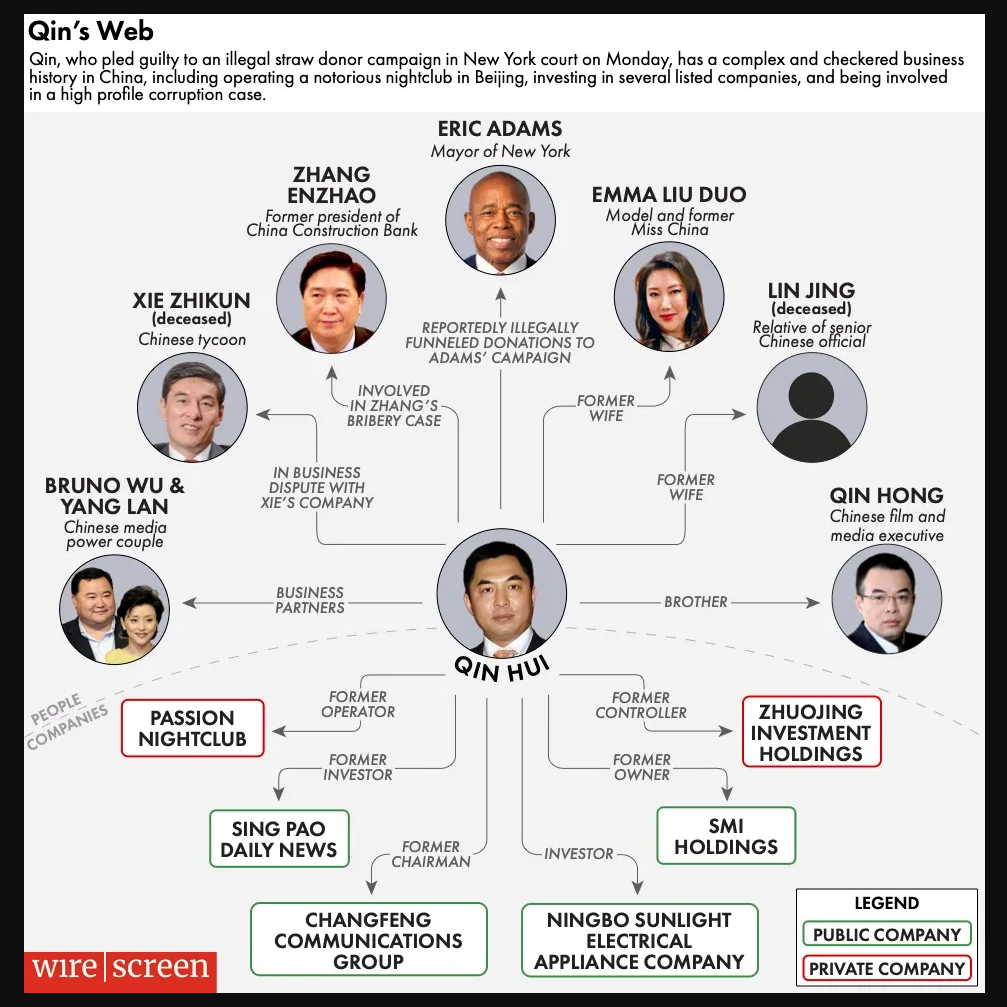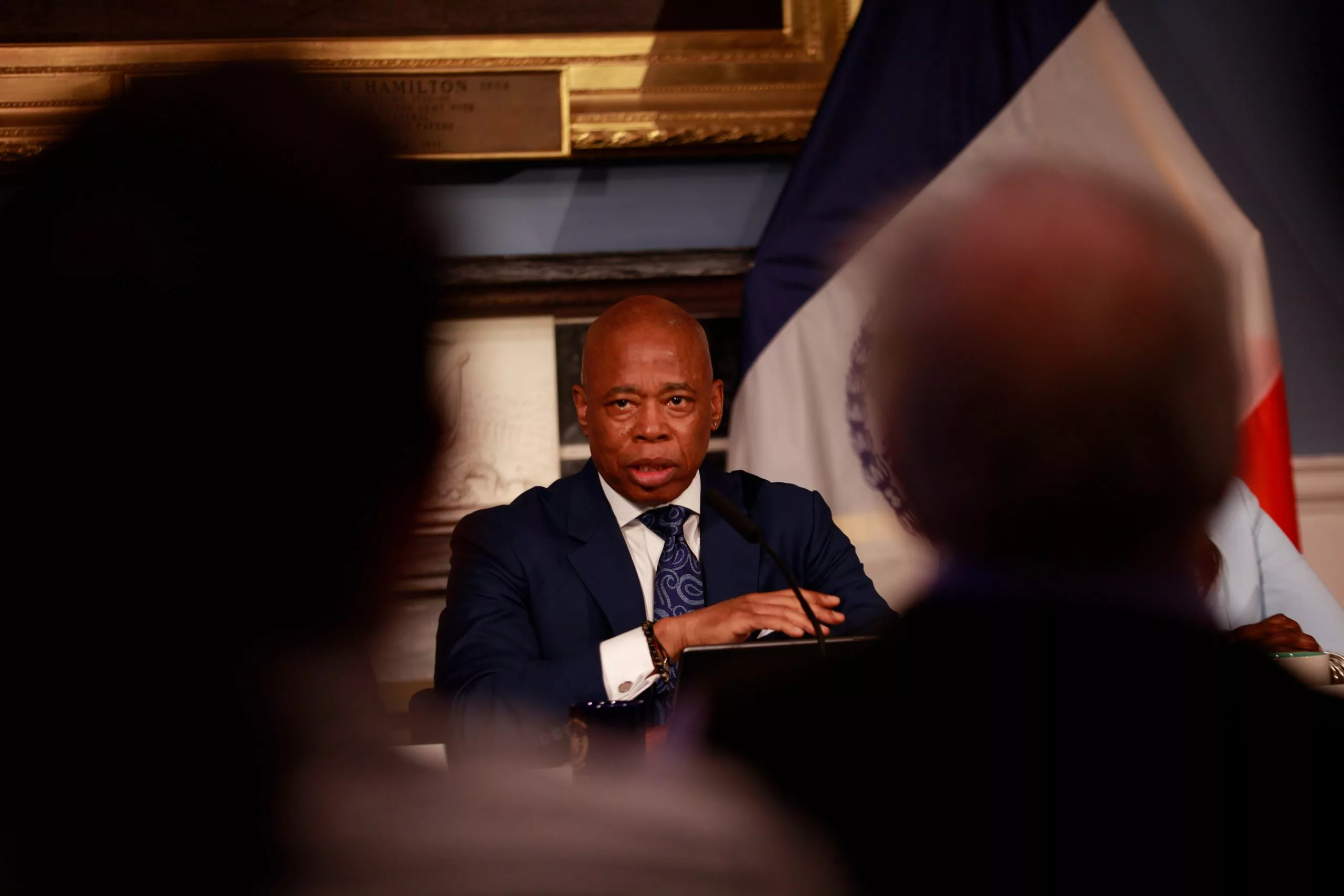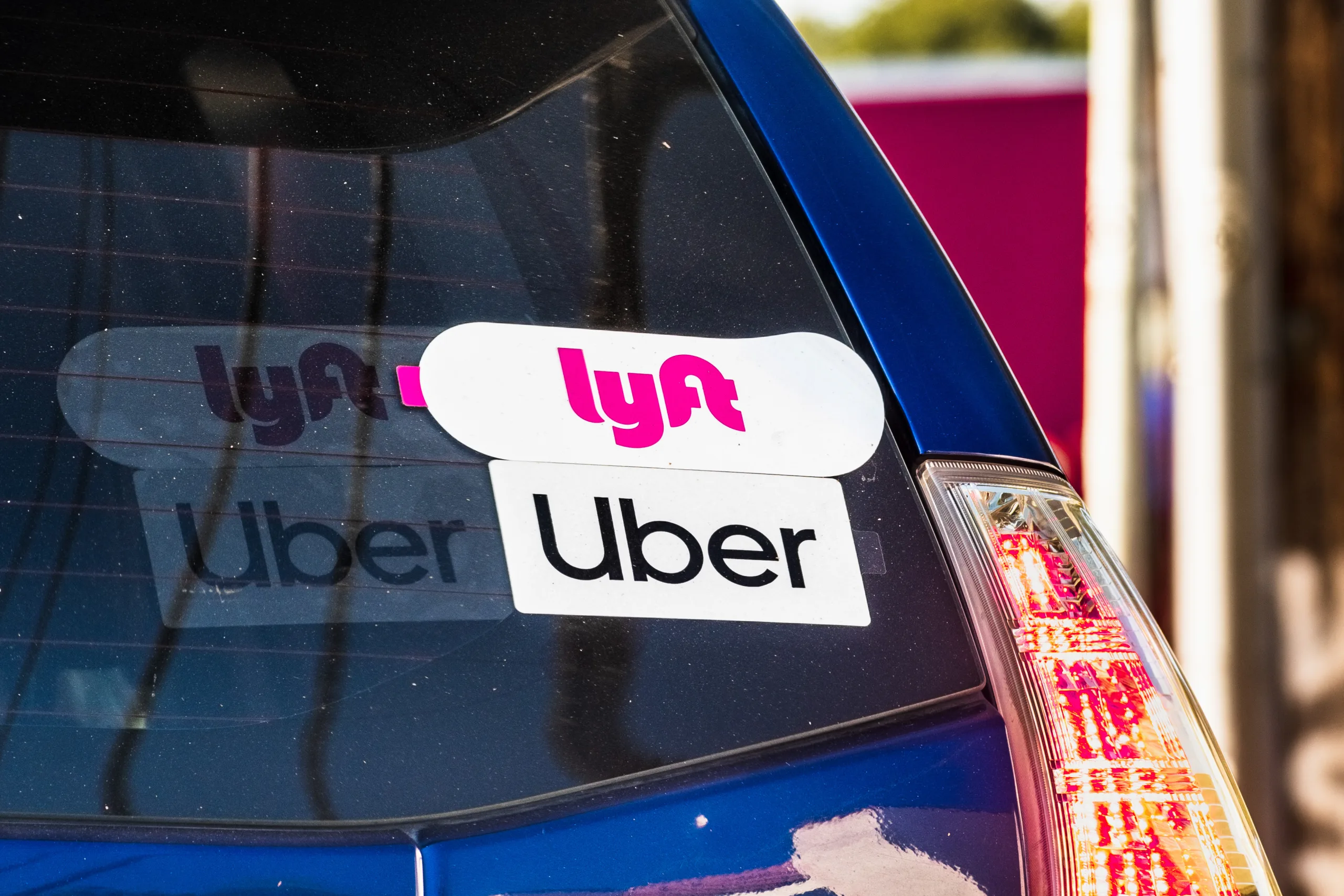This article was originally published in The Wire China, a digital news magazine dedicated to understanding China’s economic rise and its impact on the rest of the world. Sign up for The Wire’s free weekly newsletter.
阅读中文版:起底覃辉:为亚当斯非法捐款的亿万富豪在中国的黑历史
When Chinese billionaire Qin Hui pled guilty last Monday to illegally funneling more than $11,000 worth of donations to politicians in New York and Rhode Island, much of the reporting focused on his alleged ties to beleaguered New York mayor Eric Adams.
The charges in a New York federal court against Qin — who faces up to 27 years in prison — didn’t mention Adams by name. But the New York Times reported that the mayor was one beneficiary of a so-called ‘straw donor’ scheme, through which Qin recruited and paid several individuals to donate to campaigns on his behalf, starting in 2021.
In a press conference on Tuesday, Adams acknowledged meeting Qin. “He’s one of those people who I met while on the campaign trail,” he said, “the thousands upon thousands of people that I interacted with from different walks of life.” A lawyer for the 2021 Adams campaign told The Wire he could not confirm the mayor was one of the unnamed politicians in the complaint, and said, “as the federal government made clear, the campaign had no knowledge of a straw donor scheme — and no member of the campaign has been charged with or accused of any wrongdoing.”
To say that Qin — who also admitted to fraudulently obtaining a U.S. green card and Florida drivers license — comes from a “different” walk of life is something of an understatement.
A former high-end nightclub owner in Beijing who launched a Chinese media empire in the early 2000s, Qin’s colorful past includes being involved in a high profile bribery case in China and punished by the country’s securities regulator. Previously married to the relative of a senior Chinese political leader, Qin is a shareholder in over 100 Chinese companies, according to data from WireScreen. In 2018, he reached a net worth of $1.8 billion, according to Forbes.
A lawyer for Qin declined to comment on the straw donor case.
Qin was born in 1968 and grew up in Beijing. While in primary school he met his future wife, a relative of the wife of Li Xiannian, who served as China’s president from 1983 to 1988 under Deng Xiaoping, according to an interview Qin gave in 2018.
“You could say we were childhood sweethearts,” he said in the interview of his first wife, who died in 1996, according to Chinese media. “I didn’t know much about her family at that time.”
Qin’s business career took off in the 1990s, when he set up a series of trading and investment firms, according to WireScreen, and bought a stake in a firm which operated a notorious nightclub called Passion, also known as Tianshang Renjian in Chinese, which catered to Beijing’s elite and was housed in one of the city’s luxury hotels.
“It was like a place out of a James Bond movie — the sort of place where Bond would meet the Bond girl of the film, and he would meet her on the arm of the villain,” says Kaiser Kuo, the host of the China-focused Sinica podcast, who visited the club on a reporting trip. To run an establishment like that, he added, “you would have to have extraordinary connections. It was clearly protected in some way.”
The club was shut down in 2010 amid a broad police crackdown on the city’s nightlife, but Qin never fully escaped association with the legendary watering hole. “The media that talks nonsense about Passion insults my character,” he said in the 2018 interview. “I can tell you that I am still proud of having been the boss of Passion. I was once its shareholder, and I have nothing to be embarrassed about.”

The link with Passion didn’t hold Qin back. In the early 2000s, he started investing in the public markets. He used one of his companies, Zhuojing Investment Holdings, to become the largest shareholder in a Shenzhen-listed firm, Chongqing Changfeng Communications, serving as chairman starting in 2002, according to company filings. Changfeng had stakes in several communications and internet companies across China.
Qin then set his sights on the Hong Kong stock market. In 2003, he took over a Hong Kong-listed movie production and entertainment firm, renaming it SMI Corporation, and bought a 70 percent stake in Sun TV, the Hong Kong television channel started by Yang Lan and Bruno Wu, a Chinese media power couple. The next year, he invested in a public company which owned Sing Pao Daily News, a Hong Kong newspaper, according to filings.
In 2005, Qin’s soaring success hit a snag. Zhang Enzhao, the president of state-owned China Construction Bank, was sued in U.S. court for taking bribes from an American financial services company and later sent to jail for fifteen years in China for bribery allegations. Chinese state media revealed that Qin was among those who bribed the banking chief, and in April, 2005, one of Qin’s companies disclosed that he was assisting in a police investigation.
Also Read: As a Chinese Billionaire Illegally Donated to Adams, His Ex-Wife Built Her Own Bridges To The Mayor
Qin was never charged, and in the years after the investigation, SMI opened movie theaters all across China. His brother, Qin Hong, who served as chairman of SMI, launched a movie production business in Beijing, J.Q. Pictures Holdings, which helped make movies with stars like Jackie Chan.
In recent years, Qin has suffered a string of setbacks. In 2015, he took over a Shenzhen-listed company called Ningbo Sunlight Electrical Appliance Company. It’s unclear why Qin decided to invest in the consumer electronics firm, but according to WireScreen, two of its other top shareholders around the time of his takeover were linked to Xiao Jianhua, the once high-flying financier to China’s elite who was abducted from his Hong Kong hotel in 2017 and put in prison for financial crimes.
Three years after Qin’s takeover, the China Securities Regulatory Commission (CSRC) determined that Ningbo Sunlight had inflated profits and made false disclosures. It fined Qin more than $80,000 and banned him from trading for five years. In 2020, SMI, Qin’s Hong Kong firm, was delisted after failing to pay back more than $100 million in debt.
In 2019, Qin received a U.S. green card and seemed to relocate to New York: His then wife, Emma Liu Duo, a model who was crowned Miss China in 2006, is a U.S. citizen. Along with their two children, the couple — who divorced in 2021 — lived in a mansion with eleven bathrooms on Long Island as well as two apartments in Manhattan’s Plaza Hotel, which sits at the edge of Central Park, according to legal filings. Liu did not respond to requests for comment.
TestPost3
But Qin’s legal issues followed him to U.S. shores: Last September, he was arrested by police in New York’s Nassau County, and charged with intent to damage property. In 2021, he was sued in New York by Huzhou Chuangtai Rongyuan Investment Management Partnership, a Chinese investment group majority owned by Xie Zhikun, a Chinese billionaire who died of a sudden heart attack that same year. Huzhou Chuangtai is attempting to enforce a $450 million arbitration award which was originally handed down in China. A lawyer for Qin told The Wire in an email that the Nassau County charge is “baseless” and the original award in the Huzhou Chuangtai case “had a lot of irregularities”. Lawyers for the investment group did not respond to requests for comment.
Also Read: 8 Things to Know About The FBI Investigation Into Eric Adams’ Campaign
It’s unclear why Qin was allegedly illegally funneling money to political candidates in the U.S., but the case comes amid broader legal issues for Adams. The FBI is investigating whether the mayor took illegal donations from the Turkish government, according to New York Times reporting, and late last month, the FBI raided two homes owned by Winnie Greco, a prominent fundraiser and the mayor’s director of Asian affairs. Qin’s ex-wife, Liu, was named to Adams’ Asian Affairs Advisory Council, which Greco led, The City and Documented reported this week. On Monday, Adams was also accused of sexually assaulting a former colleague in a lawsuit, though the mayor denies the allegations.
“It adds another layer to the controversy swirling around Adams — it is not the first straw donor campaign, and it is not the first foreign interference scheme he has been accused of,” says Anna Massoglia, who studies foreign influence at OpenSecrets, a nonprofit research group. “We don’t know what the ultimate impetus is [behind Qin’s scheme]. There could be a lot going on behind closed doors.”












